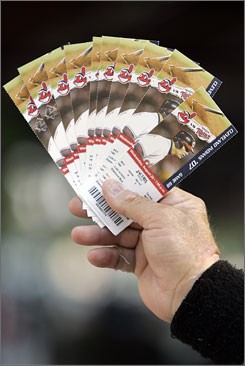Consider the scalper, a guy standing outside FedEx Forum waving his arms, maybe holding a sign, and hollering “who needs (or has) extra tickets?”
A hustling street-level entrepreneur exploiting market inefficiencies, serving willing customers, and establishing a secondary-market price, like his well-dressed counterparts on Wall Street pricing the Facebook IPO or the computers at Delta Airlines that change ticket prices minute by minute?
Or a scourge rigging the game and jumping the line and creating bogus prices, like his well-dressed counterparts on Wall Street pricing the Facebook IPO or the computers at Delta Airlines that change ticket prices minute by minute?
Or a relic of an innocent age before paperless tickets and smart phones and a bit player in a bigger battle between corporate giants StubHub (owned by eBay) and Ticketmaster?
Some 60 Tennessee sports and entertainment organizations, including the Memphis Grizzlies, FedEx Forum, Beale Street Music Festival, Live at the Garden, and The Orpheum, have banded together “to stop the rampant problems caused by deceptive, professional scalpers” according to a news release this week.
The Tennessee Sports & Entertainment Industry Coalition (TSEIC) is calling on the Tennessee General Assembly to do something next year. The proposed legislation, called the Fairness in Ticketing Act, “will strengthen the free market by empowering fans to make informed decisions when they purchase tickets for sports, musical, and other performance events held in Tennessee.”
Its sponsor, Rep. Ryan Haynes of Knoxville, introduced a similar bill in the last session. One of the coalition members is country singer Eric Church, the subject of an investigative report by Phil Williams in Nashville earlier this year.
Coalition members include major sports and music venues in Memphis, Nashville, and Knoxville. “These are the organizations that have an investment, employ people, pay taxes, entertain, and help drive tourism for Tennessee as opposed to out-of-state scalpers who do not contribute to the growth of Tennessee.”
The pressing issue appears to be the Internet and paperless tickets more than people standing outside stadiums and arenas hawking a pair of tickets. An impresario in the tickets game told me scalping, also known as “dynamic pricing,” is one facet of a battle between StubHub and Ticketmaster that is playing out in Tennessee and other states. The issues include consumer fairness and how and through what channels tickets are transferable on the resale market.
From the news release: “The unscrupulous scalpers ruin the ticket market for fans,” said Sean Henry, president and chief operating officer of the Bridgestone Arena and Nashville Predators. “The bad actors do not participate in a free market; they manipulate a black market that raises prices for everyone. They cut ahead of fans during internet onsales with sophisticated and often illegal software. They drive a wedge between fans and artists, teams and venues. They hike up prices. They refuse to disclose who they are, where they operate and if they actually have the tickets they claim to sell. They create an environment rife with counterfeits and fraud and fans are left disappointed and cheated. The Fairness in Ticketing Act is a consumer protection bill. It would restore the free market and protect fans that spend their hard-earned dollars on live entertainment.”
Scalpers purchase some of the best seats as soon as they go on sale. By using bots, scalpers cut in line ahead of customers buying through official channels.
Counterfeit tickets are one risk of buying from scalpers. Scalpers use websites that masquerade as being affiliated with venues, sports teams, or recording artists to mislead fans into purchasing tickets on the resale market, often for prices well above face value. This deceiving tactic is often used when face-value tickets are still available through primary ticket sellers and the box office.
Teresa Ward of the Orpheum Theater told me there have been many times when she has seen patrons in tears who were misled by online brokers or copycat sites similar to the historic theater’s official site. Some tickets have been sold multiple times, and only the first customer showing that ticket gets the seat. An upcoming show stars Eddie Vedder. Ward said 46 percent of the available tickets sold within seconds to organized scalpers in Connecticut, Las Vegas, and Florida.
Eric Granger, vice president of arena operations for FedEx Forum, said copycat sites are a chronic problem “on the availability of what you can get at what price.” Some fans found out too late that they had illegitimate tickets for the Justin Bieber concert last week, he said. FedEx Forum has an exclusive contract with Ticketmaster.
The Fairness in Ticketing Act will be filed in the 2013 session of the Tennessee General Assembly. The act proposes consumer protections for the online ticket resale market for Tennessee events. Provisions include requiring resellers to disclose original face value, seat location, and whether the reseller actually has the tickets they are selling in hand and explaining to consumers the differences in non-sanctioned and unofficial resale sites.
For more information on the Fairness in Ticketing Act, go here.
